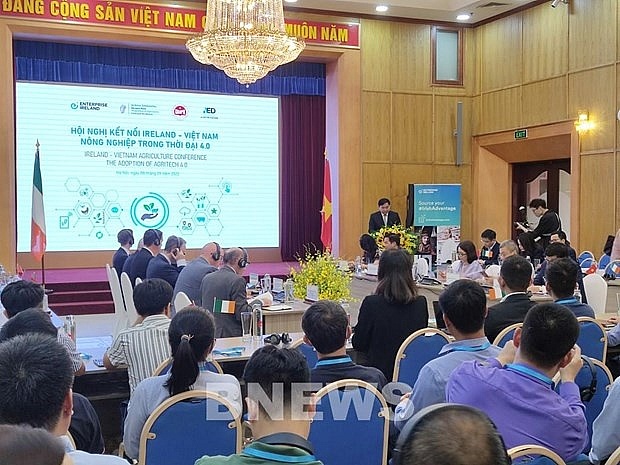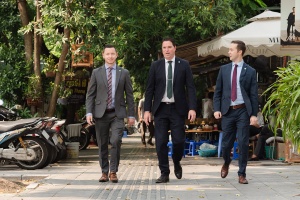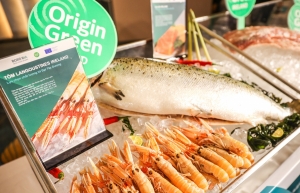Irish welcome new agri-cooperation
Irish and Vietnamese agri-food authorities will embark on a new phase of cooperation from 2023, Martin Heydon, Minister of State at the Department of Agriculture, announced at a trade mission in Hanoi last week. Ireland will work with Vietnamese and international counterparts to support Vietnam’s journey in transforming its food system.
 |
| An overview of the conference (Photo: VNA) |
“Ireland is committed to becoming a global leader in sustainable food systems, as outlined in the Food Vision strategy. This underpins our relationship with Vietnam,” Heydon said. “We will work with our counterparts to help Vietnam realise its own goals around economic, environmental, and social sustainability in agri-food through knowledge sharing, innovation, education, and joint research activities. It is an important part of Ireland’s political, trade, and economic relationships with this dynamic and fast-growing nation.”
Last week’s Ireland-Vietnam Agriculture Conference on the adoption of 4.0 agritech is Ireland’s second ministerial-led event in Vietnam in recent years.
Since 2010, the Irish Department of Agriculture has committed more than $200 billion to research projects funded under these research programmes. Heydon said this type of investment would continue to be a top government priority.
“The food sector has always been at the forefront of scientific research innovation. Given the opportunity and the challenges the sector faces, calling for more investment in climate change mitigation technologies and practices will help reduce the sector’s greenhouse gas emissions,” he said.
While Vietnam offers most of the world’s desirable livestock, its performance and added value are modest. Nguyen Xuan Duong, vice chairman of the Vietnam Animal Feed Association, said that technologies in the agriculture sector are uneven and unsynchronised.
“Cattle production and milk processing have the most modern and synchronised technology, accounting for over 60 per cent of the total dairy herd, which is the most advanced in Asia and is derived largely from Europe and the United States,” Duong said.
Industrial pig and chicken farming in large enterprises and farms (accounting for about 30 per cent of the total herd) use modern automated technology from the EU, US, and Taiwan.
“However, slaughtering and processing technologies of livestock products are still limited. Currently, about one-fifth of the market share is modern and synchronised with the remaining a manual process,” Duong said.
Imported feed accounts for more than 70 per cent of the total demand, with the industrial sector accounting for the vast majority. In 2021, imports totalled 21.9 million tonnes, worth approximately $9 billion, mainly from America, Brazil, Argentina, India, China, Australia, and Eastern Europe.
Vietnam’s livestock development strategy to 2030 sets to increase production by 4-5 per cent per year during 2021-2025 and 3-4 per cent per year during 2026-2030.
Irish businesses have suggested several farming solutions, such as Abbey Retail’s low emission slurry spreading technology to reduce ammonia losses during application; Celtic Sea Minerals’ Acid Buf as a nutritional solution to increase feed efficiency on dairy farms by promoting optimum digestion; and CeltiCal, a sustainable marine mineral complex to improve flock performance while reducing production costs and enhancing animal health.
Additionally, a cooperation programme between the two countries funded by Ireland’s Department of Foreign Affairs will involve state agencies, universities, and the private sector over a 5-year period. The objective is to support the country’s food system transformation journey and sustainable production systems for responsible, resilient, and low-emission agriculture through joint research training and educational links.
The Irish Department of Agriculture, through its support to the United Nations Food and Agriculture Organization, will provide funding support for a pilot project on resilient livelihoods for rural women in the northern mountainous regions of Vietnam. The project will help increase access to resilient and sustainable agriculture value chains for ethnic minority women.
“We will support the participation of rural women in farming and food businesses in Vietnam. The project has the potential to leave a lasting legacy by empowering rural women for generations to come,” said Heydon.
The agri-food sector represents about one-quarter of economic activity and supports around half the country’s jobs. Over the last three decades, modernisation of the sector, economic openness, and increased regional and global trade have contributed to improved nutrition and reduced poverty while simultaneously leaving several negative environmental outcomes.
“We highly appreciate the support of the Irish government and want to highlight the cooperation in agriculture of both countries’ governments and businesses to help Vietnam overcome challenges and make breakthroughs in development,” said Deputy Minister of Planning and Investment Tran Duy Dong.
 | Irish-Vietnamese trade set to increase following closer cooperation The Irish Food Board (Bord Bia) is launching a new business strategy for Southeast Asia to raise exports to €800 million ($796 million) by 2025 as part of the Irish trade mission to Vietnam. |
 | Culinary delicacies made from Irish seafood and pork impress The Irish Food Committee (Bord Beer) continues to offer a culinary show to showcase the diversity and rich culinary applications of Irish seafood and pork through special dishes from chef Hungazit in Hanoi. |
What the stars mean:
★ Poor ★ ★ Promising ★★★ Good ★★★★ Very good ★★★★★ Exceptional
Related Contents
Latest News
More News
- Kurz Vietnam expands Gia Lai factory (February 27, 2026 | 16:37)
- SK Innovation-led consortium wins $2.3 billion LNG project in Nghe An (February 25, 2026 | 07:56)
- THACO opens $70 million manufacturing complex in Danang (February 25, 2026 | 07:54)
- Phu Quoc International Airport expansion approved to meet rising demand (February 24, 2026 | 10:00)
- Bac Giang International Logistics Centre faces land clearance barrier (February 24, 2026 | 08:00)
- Bright prospects abound in European investment (February 19, 2026 | 20:27)
- Internal strengths attest to commitment to progress (February 19, 2026 | 20:13)
- Vietnam, New Zealand seek level-up in ties (February 19, 2026 | 18:06)
- Untapped potential in relations with Indonesia (February 19, 2026 | 17:56)
- German strengths match Vietnamese aspirations (February 19, 2026 | 17:40)

 Tag:
Tag:




















 Mobile Version
Mobile Version